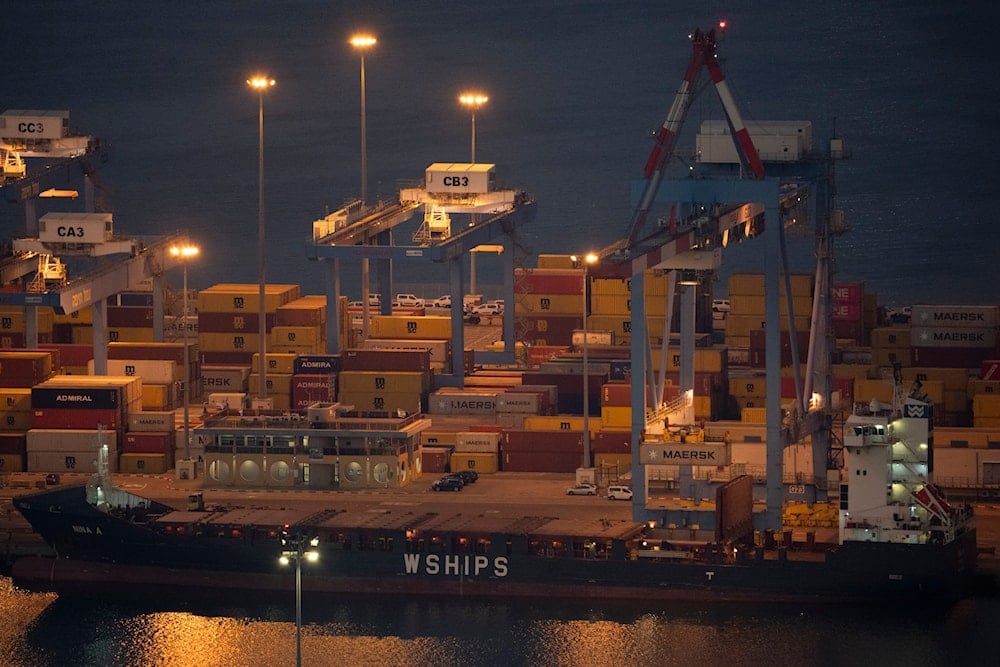'Israel's' economy suffers slow growth after 11th month of war on Gaza
The Central Bureau of Statistics reports that during the second quarter, corporate production fell by 1.9% while exports of goods and services fell by 8.3%.
-

A cargo ship is seen docked at a containers terminal in the port of Haifa, Aug. 15, 2024. (AP)
Preliminary data released on Sunday by the Central Bureau of Statistics shows that "Israel's" economy expanded considerably more slowly in the second quarter of the year than economists had predicted, as the occupation's months-long war on Gaza continue to have a negative impact on exports and investments.
According to an initial estimate by the statistics agency, the gross domestic product (GDP) expanded at an annualized 1.2% in the April to June period compared with the previous three months and decreased by 1.4% in comparison with the equivalent quarter last year, putting the figure at less than the 2.3% to 5% range that economists had predicted. In the meantime, GDP decreased 0.4% on a per capita basis in the second quarter after accounting for population increase.
Bank Mizrahi-Tefahot chief markets economist Ronen Menachem explained, “Gross domestic product per capita shrank both compared to the previous quarter and compared to the corresponding quarter last year, a figure that clearly indicates the significant damage that the ongoing war is causing to the economy."
The statistics office reported that during the second quarter, corporate production fell by 1.9% while exports of goods and services fell by 8.3%. The increase in fixed asset investment was only 1.1%.
According to Jonathan Katz, chief economist at Leader Capital Markets, "Wage growth and government support to evacuees and mobilized soldiers" drove the second quarter's robust growth of 23.5% in private expenditure, one of the key drivers of economic activity. In the first quarter, private spending increased by 12%.
Earlier this month, Fitch Ratings lowered "Israel's" credit rating from "A+" to "A" with a negative outlook, citing the ongoing war against the Gaza Strip, which has had a tremendous impact on "Israel's" public finances.
Analysts at Fitch noted that the downgrade "reflects the impact of the continuation of the war in Gaza, heightened geopolitical risks, and military operations on multiple fronts." It was also reported that they anticipate the war on Gaza could persist until 2025 and potentially expand to other fronts.
Fitch also highlighted that increased military spending, human losses, infrastructure damage, and continued economic and investment disruptions could lead to further credit deterioration. Regional tensions remain high.
Meanwhile, former Israeli occupation forces ombudsman Major General Itzhak Brik last week pointed to the larger-scale cost of the Israeli war on Gaza in an article he wrote for Maariv.
The former Israeli official decried the current battles as a "war of attrition" that has affected the Israeli regime for nearly a year. He said that the war is leading to the "collapse of the Israeli economy."
He said that the occupation is facing a "deficit exceeding 8%" of Gross Domestic Product (GDP). Brik revealed that officials in the Israeli Finance Ministry fear that the deficit will increase to 9% of GDP this year, a number that far exceeds the 6.6% target the government had expected.
"Many of the driving forces behind the growth of the Israeli economy, namely high-tech entrepreneurs, are leaving Israel," Brik added.

 3 Min Read
3 Min Read








